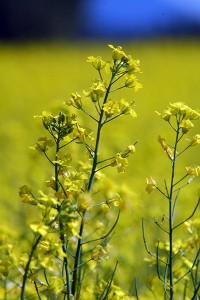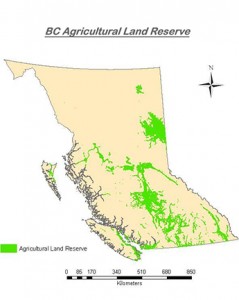Home »

ALC Act changes supposed to encourage farming
New regulations under the Agricultural Land Commission Act will encourage farming and help B.C.’s agricultural community fill the growing demand for B.C. food, locally and around the world, Agriculture Minister Norm Letnick announced yesterday (June 15).
The regulations will help farmers throughout B.C. take advantage of the demand for value-added B.C. goods by promoting the use of co-operatively owned processing facilities. The changes make it easier, for example, for berry growers to use co-operatively owned facilities to make value added products like jams or sauces, or flash freeze them for off-season sales, a Ministry of Agriculture press release explained.
 Similarly, the regulation creates opportunities for producers in the north and east to pool resources and establish value-added facilities for fruits, grains, honey and other crops. The opportunity for B.C. farmers to increase their income through value-added products also encourages farmers to expand their business models and consider growing additional crops in theAgricultural Land Reserve (ALR).
Similarly, the regulation creates opportunities for producers in the north and east to pool resources and establish value-added facilities for fruits, grains, honey and other crops. The opportunity for B.C. farmers to increase their income through value-added products also encourages farmers to expand their business models and consider growing additional crops in theAgricultural Land Reserve (ALR).
The regulations also support the growing appreciation of B.C. wines, beers and spirits by locals, as well as those visiting B.C. breweries, distilleries and meaderies will be permitted to operate on ALR land on terms similar to wineries, requiring at least 50% of the products used to make the beverage be grown on the farm. Another change, subject to the results of consultations being conducted by the Liquor Control and Licensing Branch, will permit alcohol producers in the ALR to offer alcohol from other producers to their lounge and restaurant guests, so winery guests who prefer a beer with their meal can have one.
Government is currently consulting on this, with plans to open up the opportunity to manufacturers later this year, so that any winery, brewery, cidery, distillery or meadery can sell products made off-site in their lounges – aligning with a recommendation made in the B.C. Liquor Policy Review.
The change will create more opportunities for B.C. farmers to grow and produce crops used for these beverages, as well as building on British Columbia’s growing international reputation for culinary tourism, the Agriculture Ministry suggested.

In 2014, two ALC-administered zones were created to better recognize the province’s regional differences. Zone 2 includes the Interior, Kootenay and North regions, where growing seasons are shorter than elsewhere in the province. One other change in the regulation supports succession planning in Zone 2, by allowing retiring farmers to continue living on their family farm after they’ve sold it using a lease for a life term. The retiring farmers can continue to live on the farm they have worked on, while sharing their knowledge with the next generation of farmers who have purchased their farm, and keeping the entire piece of land in production, growing crops and food.
The Regulations are also one part of the B.C. government’s efforts to grow the Agrifood Sector to $14 billion by 2017, by supporting high-quality, high value products, building domestic and international markets and securing a strong future for farming.
“We heard in our extensive consultations with representatives of about 100 farming groups and local governments, that British Columbians wanted these regulations to help preserve farmland and encourage agriculture, and that’s what we’ve delivered,” Letnick said, adding, “These regulations provide farming families the chance to earn a higher income, and prepare for the transition of the farm from one generation to another, ensuring B.C. has a growing agrifoods economy and reliable food source for years to come.”
BC Agriculture Council chair Stan Vander Waal noted the “regulations are good news for BC agriculture. B.C. farmers have been calling for the modernization of the Agriculture Land Commission Act for some time. With these regulations BC farmers can explore new farm business opportunities under continued proactive oversight by the independent Agriculture Land Commission (ALC). BCAC trusts the ALC to administer these new regulations in accordance with the commission’s primary purpose, which is to keep B.C. farmland for farming.”
Despite the good news feel to the provincial press release, Columbia River-Revelstoke MLA Norm Macdonald said a much deeper look at what is happening on B.C.’s farmland is needed.
 “This kind of ‘good news’ announcement doesn’t make up for more substantive harmful actions that the BC Liberals have already taken concerning the protection of farm land and the promotion of food production and security. The BC Liberals have made two absolutely fundamental changes to the Agriculture Land Reserve that will negatively impact food production in British Columbia, and that is the real BC Liberal record on the ALR,” Macdonald told e-KNOW.
“This kind of ‘good news’ announcement doesn’t make up for more substantive harmful actions that the BC Liberals have already taken concerning the protection of farm land and the promotion of food production and security. The BC Liberals have made two absolutely fundamental changes to the Agriculture Land Reserve that will negatively impact food production in British Columbia, and that is the real BC Liberal record on the ALR,” Macdonald told e-KNOW.
“The first is making it possible to remove land from the Agricultural Land Reserve for a whole host of ill-defined reasons, on 90% of the currently protected land. This is the Zone 2 referred to in the government’s press release. This land was protected for a reason, to ensure that we have suitable land for growing food now and into the future. Under the BC Liberals, the land that we need to feed ourselves could easily disappear.
“The second change is the very poor public policy enacted by the BC Liberals concerning who makes the decisions about which pieces of land will be removed from the ALR. When land is removed, the value of that land can increase dramatically. So dramatically that it is worthwhile to some to abuse the system. For instance, a politically appointed government staffer back in 2003 admitted to accepting a bribe of $50,000 in order to get land out of the ALR. The zoning change was so valuable to the real estate developer, that $50,000 was a small price to pay,” Macdonald pointed out.
“Local land commissions making decisions about ALR exclusions are appointed by the BC Liberals, and many people believe that some of these appointments are made based more on partisan affiliation than on ability to make good decisions. And now, the highly respected non-partisan chair of the Agricultural Land Commission Richard Bullock has been fired by the BC Liberals and replaced with a failed BC Liberal candidate with no experience in agriculture at all,” he said.
“Should we be pleased with these small changes to the regulations? I think that is certainly the intent of the press release. But if we really care about food production and supporting our farmers, we need to look much deeper into what is really happening on the land,” Macdonald concluded.
Letnick’s press release explained that succession planning in Zone 2 is being supported by allowing:
* Retiring farmers who sell their property to continue living on their family farm using a lease for a life term. The retiring farmer may sell their farmland and lease back their family farm residence from the person who purchased the farm. The lease terminates when the retiree dies or leaves the property. To take advantage of this lease option, the farmer must have owned and operated the farm for at least 15 years; the farm must be at least five hectares in size; and the portion of the land that is leased back to the retiring farmer must be no larger than one hectare, the Ministry of Agriculture shared.
* Owners of larger ALR parcels (50 hectares and over), to build a second single family dwelling for family or rental income purposes, providing the total area used for residential purposes on the parcel of land is less than 4,000 m2 (43,000 sq. ft.) or 0.4 of a hectare. The area used for residential purposes includes the total area occupied by all residences and residential facilities, roads and service lines, and all land between them.
The changes follow and were guided by extensive consultations with representatives of about 100 farming groups and local governments as well as the hundreds of individual farmers and citizens who contributed their thoughts and ideas.
A summary of the consultation process and results is available HERE.
e-KNOW







